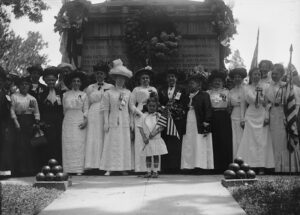.
MONDAY, MAY 31—The news from AAA’s annual Memorial Day travel forecast is that millions of American families will hit the road this year as many events—from parades to family gatherings to outdoor pools to camping opportunities—are back on the calendar this year.
AAA Travel expects a significant rebound in the number of Americans planning to travel this Memorial Day holiday weekend. From May 27 through May 31, more than 37 million people are expected to travel 50 miles or more from home, an increase of 60% from last year when only 23 million traveled, the lowest on record since AAA began recording in 2000. (You can read the entire report here.)
Memorial Day began two centuries ago as a solemn observance for the war that had consumed more lives than any other U.S. conflict. While memorial services still abound (as shown in the photo above), the national holiday today also means barbecues, beaches, parades and fireworks—although this year, many traditional festivities still will look different than they do most years.
AAA’s forecast of 37 million travelers still is 6 million less than the last pre-pandemic Memorial Day in 2019.
Best advice: Check early on programs and venues that interest you and your family. Across the nation, many veterans’ organizations are scheduling their annual cemetery rituals with requests for advance registration and plans to social distance even outdoors. After all, many attendees at these events are in the most-at-risk age group.
Some regions and civic organizations are announcing start-of-summer openings tied to the Memorial Day weekend—but advance planning also is needed in many cases. For example, the City of Albuquerque, NM, has announced that all eight city pools are reopening for the summer—however, capacity will be limited and advance registration is needed.
Reports are similar coast to coast with restrictions varying widely. Nearly every Memorial Day announcement suggests that visitors check the latest details about their destination online before arriving.
FROM CIVIL WAR GRAVESITES TO MEMORIAL DAY

A group of women at the Civil War Unknowns Monument in Arlington National Cemetery on Memorial Day, circa 1915. Photo courtesy of Wikimedia Commons
Memorial Day began as an annual, grassroots practice of sprucing up the gravesites of the countless Americans who died during the Civil War. That’s why, for many years, the observance was called Decoration Day, describing the flowers and colorful flags that seemed to sprout across cemeteries each spring.
For much of the 20th Century, however, the painful early roots of this observance were forgotten as proud civic boosters across the country tried to claim their own unique slices of this history. Then, Yale historian David W. Blight researched and corrected the record, finally honoring the fact that the courageous pioneers in observing this holiday were former slaves in the South who dared to decorate Yankee graves.
In his history, Race and Reunion, Blight writes: “Decoration Day, and the many ways in which it is observed, shaped Civil War memory as much as any other cultural ritual.”
Blight continued to research race and American memory in that era and was honored with the 2019 Pulitzer Prize in history for his in-depth biography, Frederick Douglass: Prophet of Freedom.
MEMORIAL DAY & CIVIL RELIGION
The famed sociologist of American religion, Robert Bellah, also shaped the evolution of Memorial Day’s meaning in a landmark article he published in a 1967 issue of Dædalus, the Journal of the American Academy of Arts and Sciences. He called his long article “Civil Religion in America,” taking the centuries-old concept of “civil religion” and kicked off decades of fresh research into how our civil religion defines our American culture. You can read Bellah’s entire original article online.
A few lines from Bellah’s article about Memorial Day …
Until the Civil War, the American civil religion focused above all on the event of the Revolution, which was seen as the final act of the Exodus from the old lands across the waters. The Declaration of Independence and the Constitution were the sacred scriptures and Washington the divinely appointed Moses who led his people out of the hands of tyranny.
Then—The Civil War raised the deepest questions of national meaning. The man who not only formulated but in his own person embodied its meaning for Americans was Abraham Lincoln. For him the issue was not in the first instance slavery but “whether that nation, or any nation so conceived, and so dedicated, can long endure.” … With the Civil War, a new theme of death, sacrifice, and rebirth enters the new civil religion. It is symbolized in the life and death of Lincoln. Nowhere is it stated more vividly than in the Gettysburg Address, itself part of the Lincolnian “New Testament” among the civil scriptures.
.
from Religious Holidays https://ift.tt/2S2DXh2

 :: Unlock Your Success with Our Digital Course →
:: Unlock Your Success with Our Digital Course →
















No comments:
Post a Comment